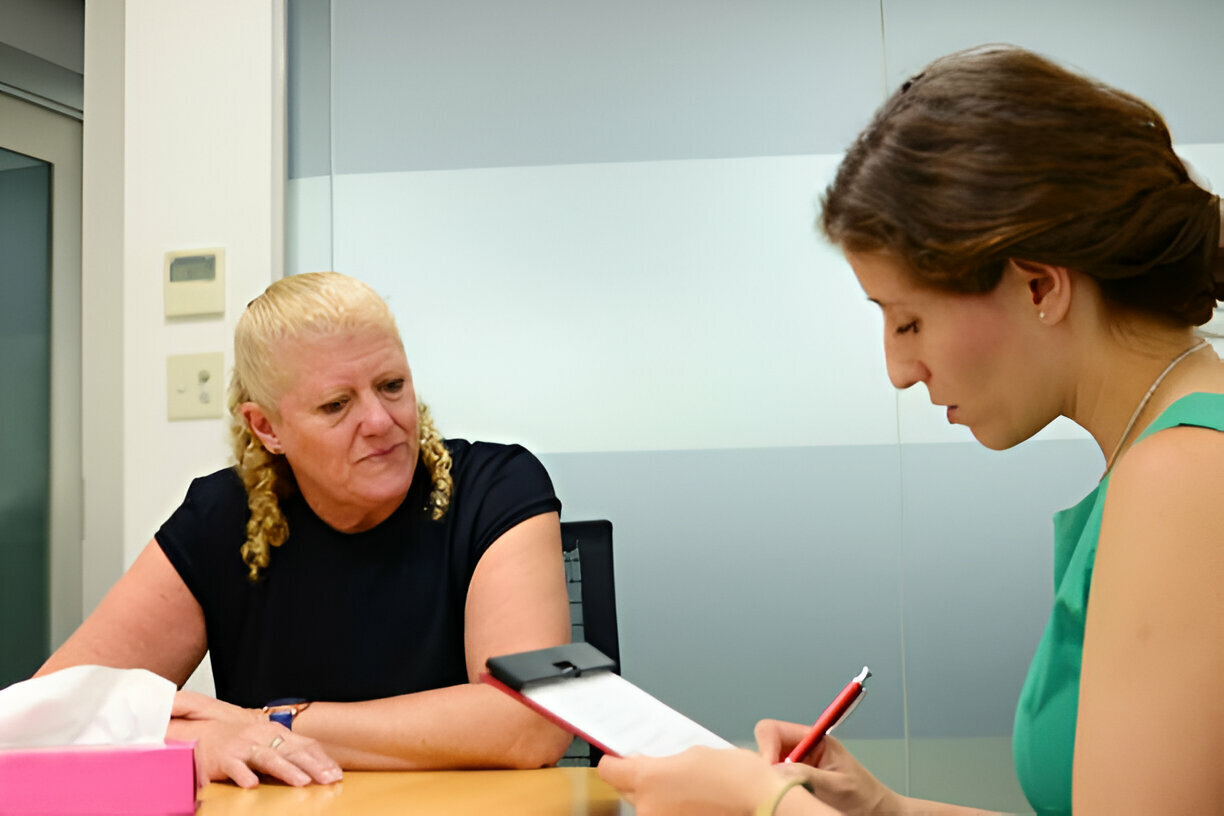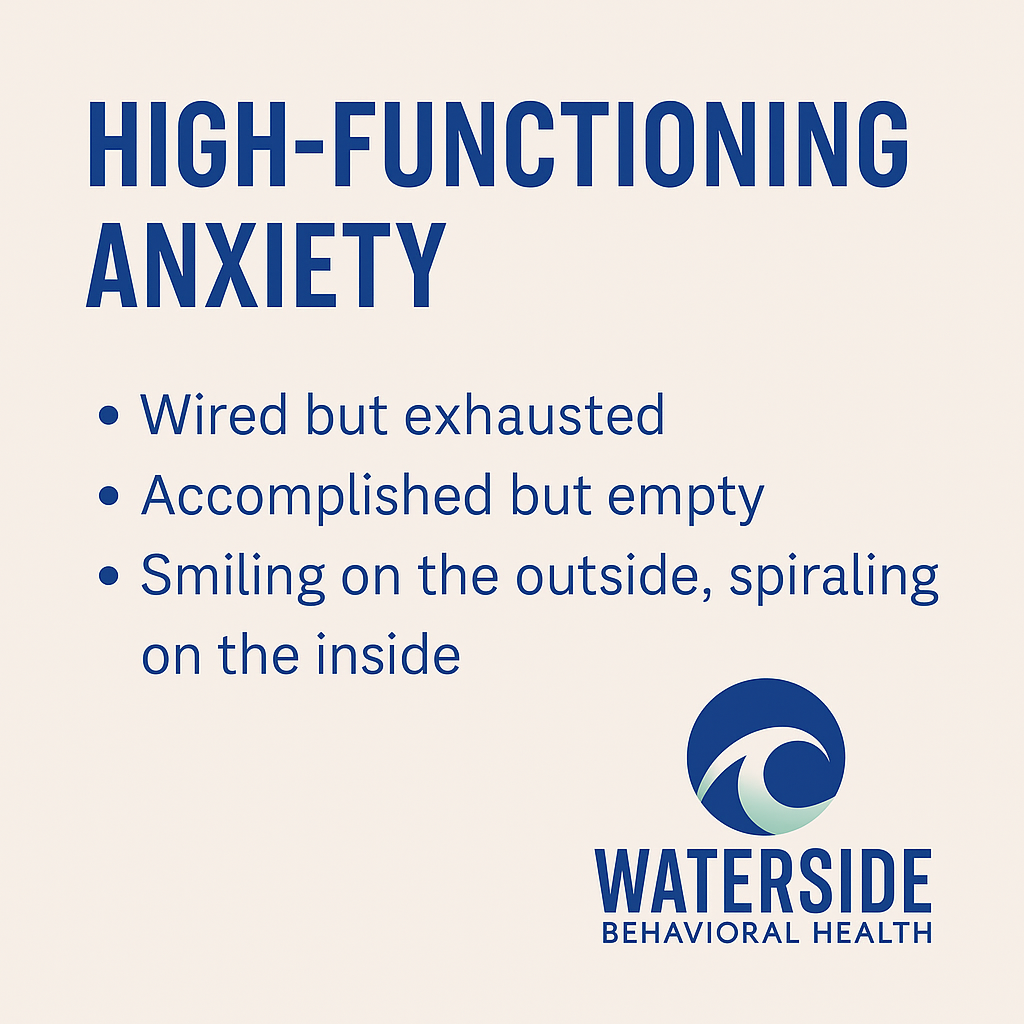If you’re the kind of person who performs under pressure, shows up no matter what, and knows how to keep a secret—even from yourself—you might be what people call “high-functioning.” You don’t fall apart. You just quietly fall further in.
And that’s why anxiety treatment gets delayed for people like you. Not because you don’t need it—but because you’ve been conditioned to believe needing help is for people who aren’t functioning.
High-Functioning Doesn’t Mean High-Wellbeing
You can show up. You can handle your inbox. You can host Thanksgiving. You can do all of this and still feel like you’re quietly drowning.
Because high-functioning anxiety doesn’t stop your life—it just steals the peace from it.
It leaves you:
- Wired but exhausted
- Accomplished but empty
- Smiling on the outside, spiraling on the inside
You’ve probably even been praised for how well you’re managing. But nobody sees that your “management” is fueled by perfectionism, pressure, and fear of falling behind.
Anxiety Hides Behind Success—That’s Why It’s So Easy to Miss
High-functioning anxiety doesn’t usually look like panic attacks or crying fits (though it can). More often, it looks like overachieving, overpreparing, overthinking. It hides behind early arrivals and constant apologizing.
You’re the one who double-checks everything. The one who volunteers because it’s easier than saying no. The one who can’t shut your brain off, even when your body is begging for sleep.
That noise? That restlessness? That constant self-editing?
That’s anxiety.
When the Fear of Falling Apart Keeps You From Getting Help
You’ve probably thought:
- “It’s not bad enough to ask for help.”
- “Other people have real problems.”
- “If I stop now, everything will collapse.”
Here’s the truth: Waiting until it gets worse isn’t strength. It’s suffering in disguise.
And the longer you wait, the harder it becomes to imagine life without that pressure riding shotgun. But there is another way—and you don’t have to fall apart to find it.
What an Intensive Outpatient Program (IOP) Offers—Without Blowing Up Your Life
Here’s what most high-functioning people get wrong about anxiety treatment: It doesn’t mean stepping away from everything.
Programs like an Intensive Outpatient Program IOP in Plymouth County are built for people just like you—people with jobs, families, and calendars that don’t stop.
You attend therapy multiple times a week but still live at home and continue your daily life. It’s structure without total shutdown. It’s support without shame.
IOPs often include:
- Group therapy for community and reflection
- Individual therapy for tailored support
- Skill-building (like CBT or DBT) for managing anxiety
- Optional psychiatric consultation for medication support
You don’t have to disappear to get better. You just have to start somewhere.
You’re Not the Only One Who Looks Okay and Feels Terrible
This is more common than you think. At Waterside, we hear this every week:
“I almost didn’t come because I thought my anxiety wasn’t serious enough. But I was barely holding on.”
– IOP Client, age 41
“I didn’t even know what feeling calm felt like until about three weeks in. I thought tension was normal.”
– Working Parent, age 35
You don’t have to identify as “sick” to benefit from help. You just have to be honest with yourself about how tired you are—and how much longer you want to keep pretending.
You Deserve Relief—Not Just Resilience
Maybe you learned early on to be strong. Maybe “handling things” became part of your identity. But let’s be honest: strength without rest is just survival.
Anxiety treatment doesn’t take your edge. It lets you keep your sharpness—without bleeding from it.
And you’re allowed to want more than just making it through the day.
If you’re looking for an Intensive Outpatient Program IOP in Bristol County, MA, or exploring options closer to Plymouth County, we’ve got space for you.
FAQs: High-Functioning Anxiety and IOP
What is high-functioning anxiety?
It’s a form of anxiety where the symptoms are hidden behind achievement. You appear successful but feel constantly anxious, restless, or drained inside. It’s often missed because you’re still “doing well.”
Is IOP too intensive for someone like me?
Not at all. IOP is designed for people who aren’t in full crisis but still need consistent, professional support. It allows you to continue working or parenting while building real coping tools.
Do I have to tell anyone I’m in treatment?
Nope. IOP schedules are flexible and private. Many participants continue their jobs or family roles while attending sessions quietly.
Can I stop once I feel better?
Yes, and ideally with guidance. Most IOPs have step-down options, so you can move into less frequent care (like weekly therapy) once your anxiety is more manageable.
What if I’m not sure it’s “bad enough”?
That thought is a red flag in itself. If you’re questioning whether your anxiety deserves help, chances are—you’ve been pushing too hard for too long.
You Don’t Have to Carry It All Anymore
Call 774-619-7750 or visit to learn more about our Intensive Outpatient Program IOP services in Plymouth County, MA.





